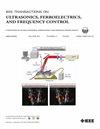Ultrasound Viscoelastography by Acoustic Radiation Force: A State-of-the-Art Review
IF 3
2区 工程技术
Q1 ACOUSTICS
IEEE transactions on ultrasonics, ferroelectrics, and frequency control
Pub Date : 2024-03-25
DOI:10.1109/TUFFC.2024.3381529
引用次数: 0
Abstract
Ultrasound elastography (USE) is a promising tool for tissue characterization as several diseases result in alterations of tissue structure and composition, which manifest as changes in tissue mechanical properties. By imaging the tissue response to an applied mechanical excitation, USE mimics the manual palpation performed by clinicians to sense the tissue elasticity for diagnostic purposes. Next to elasticity, viscosity has recently been investigated as an additional, relevant, diagnostic biomarker. Moreover, since biological tissues are inherently viscoelastic, accounting for viscosity in the tissue characterization process enhances the accuracy of the elasticity estimation. Recently, methods exploiting different acquisition and processing techniques have been proposed to perform ultrasound viscoelastography. After introducing the physics describing viscoelasticity, a comprehensive overview of the currently available USE acquisition techniques is provided, followed by a structured review of the existing viscoelasticity estimators classified according to the employed processing technique. These estimators are further reviewed from a clinical usage perspective, and current outstanding challenges are discussed.利用声辐射力进行超声粘弹性成像:最新技术综述。
超声弹性成像(USE)是一种用于组织特征描述的前景广阔的工具,因为多种疾病会导致组织结构和组成发生变化,表现为组织机械性能的变化。通过对组织对外加机械激励的反应进行成像,超声弹性成像模拟了临床医生为诊断目的而进行的手动触诊,以感知组织的弹性。除弹性外,粘度最近也被研究为另一种相关的诊断生物标志物。此外,由于生物组织本身具有粘弹性,在组织特征描述过程中考虑粘度可提高弹性估算的准确性。最近,人们提出了利用不同的采集和处理技术来进行超声粘弹性成像的方法。在介绍了描述粘弹性的物理学原理后,对目前可用的 USE 采集技术进行了全面概述,随后根据所采用的处理技术对现有的粘弹性估算器进行了结构性审查。从临床应用的角度对这些估算器进行了进一步评述,并讨论了当前面临的挑战。
本文章由计算机程序翻译,如有差异,请以英文原文为准。
求助全文
约1分钟内获得全文
求助全文
来源期刊
CiteScore
7.70
自引率
16.70%
发文量
583
审稿时长
4.5 months
期刊介绍:
IEEE Transactions on Ultrasonics, Ferroelectrics and Frequency Control includes the theory, technology, materials, and applications relating to: (1) the generation, transmission, and detection of ultrasonic waves and related phenomena; (2) medical ultrasound, including hyperthermia, bioeffects, tissue characterization and imaging; (3) ferroelectric, piezoelectric, and piezomagnetic materials, including crystals, polycrystalline solids, films, polymers, and composites; (4) frequency control, timing and time distribution, including crystal oscillators and other means of classical frequency control, and atomic, molecular and laser frequency control standards. Areas of interest range from fundamental studies to the design and/or applications of devices and systems.

 求助内容:
求助内容: 应助结果提醒方式:
应助结果提醒方式:


